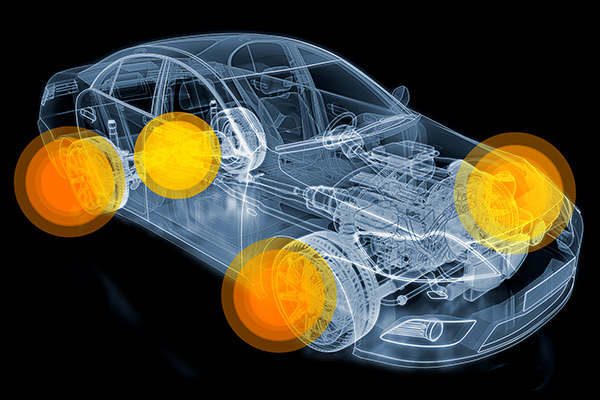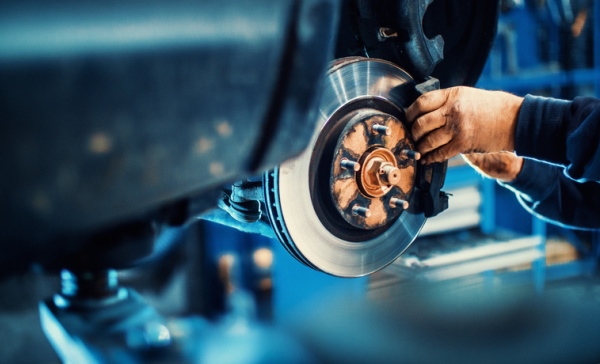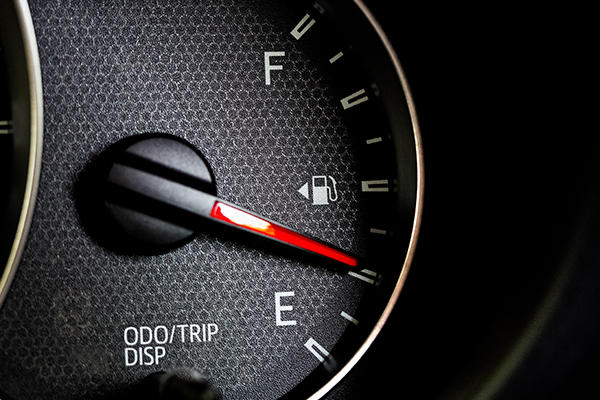Hmm. Purr. Vroom. Modern engineering has made driving a car easier on the ears than ever.
But there are some car noises you don’t want to hear, because they can signal trouble. Every once in a while, roll down the windows and start listening for “any sound that is odd,” says Mike Peth, director of technical training at Ohio Technical College in Cleveland. “You know your car, so you can often pick up something that may become a problem.”
These seven car noises might be warning signs of trouble:
- A sound like a coin in a clothes dryer.
- Brakes squealing, grinding or growling
- A finger-snapping, popping or clicking sound when you turn
- A rhythmic squeak that speeds up as you accelerate
- A howling, whining or even “singing”
- Rhythmic clunking, tapping or banging from under the hood.
- Squealing under the hood at start-up or when accelerating.
1. A sound like a coin in a clothes dryer
What it means: If you hear something rattling around inside a wheel at low speeds (and then stops as you drive faster) it could be a loose lug nut inside a hub cap. That might mean your wheel wasn’t tightened properly the last time it was removed and replaced. Take your car to a mechanic ASAP.
2. Brakes squealing, grinding or growling
What it means: If you hear a squealing noise, your brake pads or shoes might be nearing the end of their service life and must be replaced. If they grind or growl, get your brakes checked out immediately. It could be a sign that pads are so worn that metal is touching metal—a serious problem that could affect braking efficiency. (Check out these 5 signs you need new brake pads.)
3. A finger-snapping, popping or clicking sound when you turn
What it means: If you have a front-wheel-drive or all-wheel drive vehicle and hear this sound when you turn or corner (but the noise stops when you steer straight) one or both of the constant velocity (CV) joints on your front axle could need replacing.
4. A rhythmic squeak that speeds up as you accelerate
What it means: If you have rear-wheel or four-wheel drive and hear this sound, the culprit could be the universal joint (U-joint), which are found in pairs and are components of the driveshaft. Get it checked by a mechanic immediately.
5. A howling, whining or even “singing”
What it means: This is usually a sign that your bearings—tiny metal balls that help parts rotate smoothly—aren’t doing their job. But which ones? If you have front-wheel drive, and the sound changes as you turn left, right and back again, it’s likely your front-wheel bearings; a gradually growing, steady howl signals rear-wheel bearings. If you have rear-wheel drive and the whine gets louder as you accelerate, your differential, which allows your wheels to spin at different rates when needed, could be leaking fluid. Get it fixed immediately.
6. Rhythmic clunking, tapping or banging from under the hood
What it means: There could be a serious problem with valves, connecting rods or pistons. Get to a mechanic ASAP.
7. Squealing under the hood at start-up or when accelerating
What it means: This could come from worn or loose accessory belts that drive things like your power steering pump, air conditioner compressor and alternator. With newer cars, it may point to the serpentine belt, which drives multiple accessories at once, and is relatively easy and cheap to fix.
If you’re ever stranded on the road, having Emergency Roadside Service (ERS) could get you out of trouble ASAP. (It’s available through your GEICO Mobile app!) Add ERS to your policy for just pennies per day per vehicle.
By Ira Hellman
Next article: 5 Signs You Need New Tires










Hershel says,
Thinks for imfo
Marjorie Riccardo says,
Thank you for this information it’s very helpful for me being now that I am a widow and my car is old. I will add the road service to my policy.
Cosette Copperfield says,
Great help and possibly just in time. Thanks for the article.
James Flomo says,
Perfect information. This can help you avoid enormous repair expenses.
Michael says,
Thanks
Carolyn Bilbo says,
Thank you so much for this article.
Dorothea says,
Very usable information for an owner of a little bit older car, thanks GEICO, very helpful!
brian peters says,
Great tips for the every day driver.
Paul Day says,
What does it mean when your car’s transmission is fine but you have no power and upon starting there is a squealing that slowly goes away as I drive? I have been told it could be either my air intake or the exhaust system. Any ideas?
Emil says,
Check the (Maf) Mass air flow sensor.
James collins says,
Thanks for info
Eric Bryant says,
I’ll add another: Brakes whistling when you release them. This is a sign either that your brake booster needs to be replaced or that the internal mechanism inside the brakes are failing.
Maria cordero says,
Thank you
Snowblind says,
It’s not just women any longer who know nothing about cars. Since they are almost impossible to work on yourself anymore, teaching the kids how to do it themselves has dropped from part of raising them.
I find that young men also don’t know anything about cars either. Actually we have a whole generation out there who don’t know how anything works.
Marla says,
Boy, isn’t THAT the truth!! I’m glad my ex is a car WHIZ when it comes to troubleshooting and fixing most anything, so he imparted a LOT of that knowledge to my kids as WELL as myself. I can change a tire myself, check my own oil, coolant, troubleshoot basic stuff just by the noises the car is making, etc. I fear for the future generations that weren’t taught any of that. They’re the ones that you see helplessly stranded on the side of the highway.
Helen Kelcourse says,
Good Advice. .Thank you
Laura says,
Thanks for the 7 car noises you shouldn’t ignore – very good things to know. Liked the article on 5 signs you need new tires too!